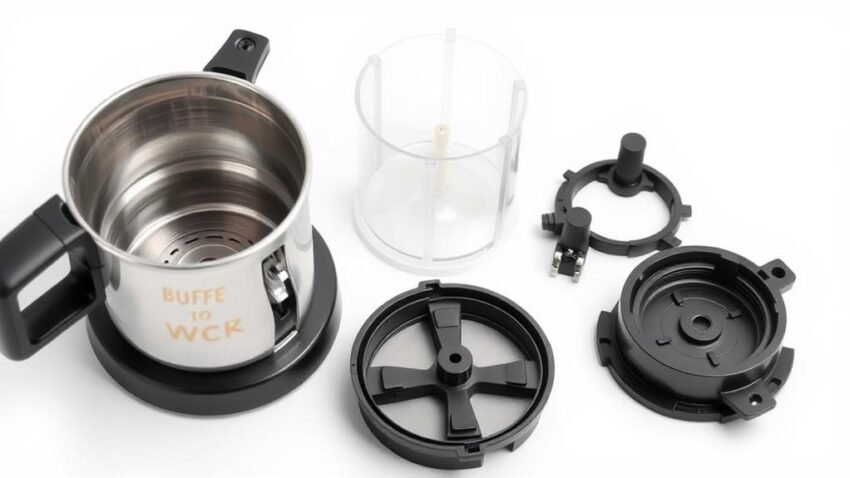When I need to replace my old coffee maker, I know that recycling it is the most environmentally responsible option. Recycling prevents toxic chemicals like lead and mercury from contaminating soil and water sources, and it also conserves natural resources and reduces greenhouse gas emissions. To recycle my coffee maker, I can donate it to organizations like Goodwill or local shelters, or I can disassemble it safely and recycle the individual parts. I can also take it to a specialized recycling center or retailer that offers electronic waste recycling services. By taking these steps, I can ensure a more sustainable approach to e-waste management, and I can learn more about the specific recycling options available to me.
Recycling Coffee Makers Responsibly
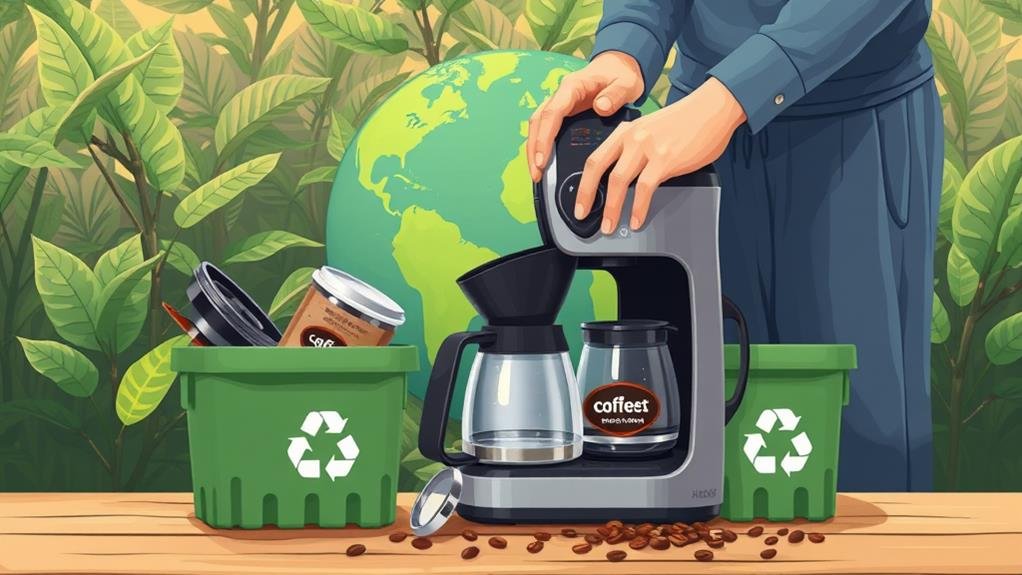
How do I responsibly recycle my coffee maker? I start by understanding that it's considered electronic waste (e-waste) due to the hazardous materials in its circuit boards. If I dispose of it improperly, toxic chemicals can harm the environment. Recycling, on the other hand, helps prevent damage, conserve natural resources, and promotes sustainability.
To recycle my coffee maker responsibly, I need to follow my state's guidelines for electronics recycling. Each state has specific rules to protect the environment and encourage responsible practices. I can search online or contact my local waste management agency to learn more.
Recycling small kitchen appliances like coffee makers makes a significant impact. By recycling just one coffee maker, I save energy equivalent to brewing 1,000 cups of coffee and reduce greenhouse gas emissions. I'll also be contributing to a more eco-friendly approach to waste management. Appliance recycling is a vital step towards a more sustainable future, and I'm doing my part by responsibly recycling my coffee maker.
Donating Old Coffee Makers
Instead of recycling my old coffee maker, I'm considering donating it to organizations like Goodwill, which can help promote reuse and reduce waste in landfills. Donating old coffee makers is an environmentally friendly way to extend their lifecycle and support charitable causes. Goodwill accepts various small appliances, including coffee makers, for donation to benefit their community programs.
| Organization | Accepted Items | Benefits |
|---|---|---|
| Goodwill | Small appliances, including coffee makers | Supports community programs and promotes reuse |
| Local shelters | Gently used household items, including coffee makers | Provides affordable options for individuals in need |
| Community centers | Donated appliances, including coffee makers | Fosters a sense of community and supports local initiatives |
Disassembling Coffee Makers Safely
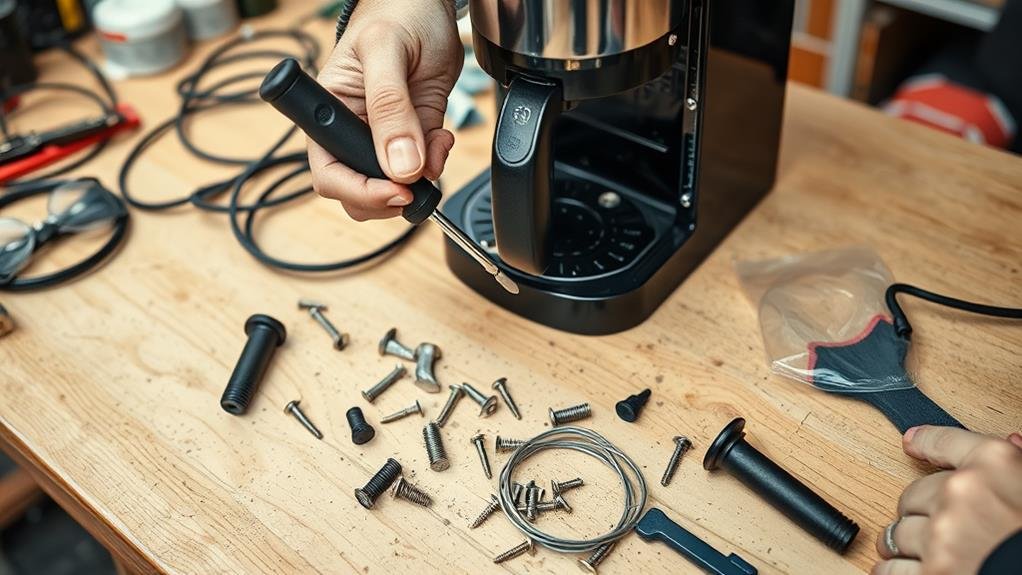
When a coffee maker reaches the end of its life, safely disassembling it becomes essential to guarantee its recyclable parts are appropriately reused. I start by unplugging the coffee maker and allowing it to cool down to prevent any accidental starts or electrical shocks. Next, I remove any detachable parts, such as the carafe, filter basket, and water reservoir, which can be recycled individually. To disassemble the main unit, I look for hidden screws or clips that may be holding it together.
Disassembling an old coffee maker requires some patience and attention to detail, but it's worth the effort to recycle its electronic components. By breaking down the coffee maker into its individual parts, I can make sure that each component is properly recycled, maximizing resource recovery and environmental benefits. Proper disassembling and recycling of coffee makers also helps reduce electronic waste, which is a growing concern worldwide. By taking the time to disassemble my old coffee maker safely, I'm doing my part to recycle and reduce waste.
Coffee Maker Disposal Options
Now that I've dismantled my old coffee maker, I need to consider where to take its parts for proper disposal and recycling. I've learned that curbside recycling programs typically do not accept coffee makers due to their electronic components. As an electronic device, my coffee maker needs specialized disposal. I'm exploring local recycling centers that may offer services specifically tailored for small appliances like mine.
Some retailers, such as Staples, also accept old coffee makers for recycling. I'll need to check with local stores to see if they participate in such programs. It is crucial to dispose of your old coffee maker responsibly to guarantee the safe handling of hazardous materials like lead and mercury. I won't be able to recycle it through regular curbside recycling, but there are alternative recycling programs available. By taking the time to recycle small appliances like my coffee maker, I'm contributing to preventing e-waste pollution and conserving resources. I'll make sure to explore all options to ensure my coffee maker is disposed of in an environmentally responsible manner.
Environmental Benefits of Recycling
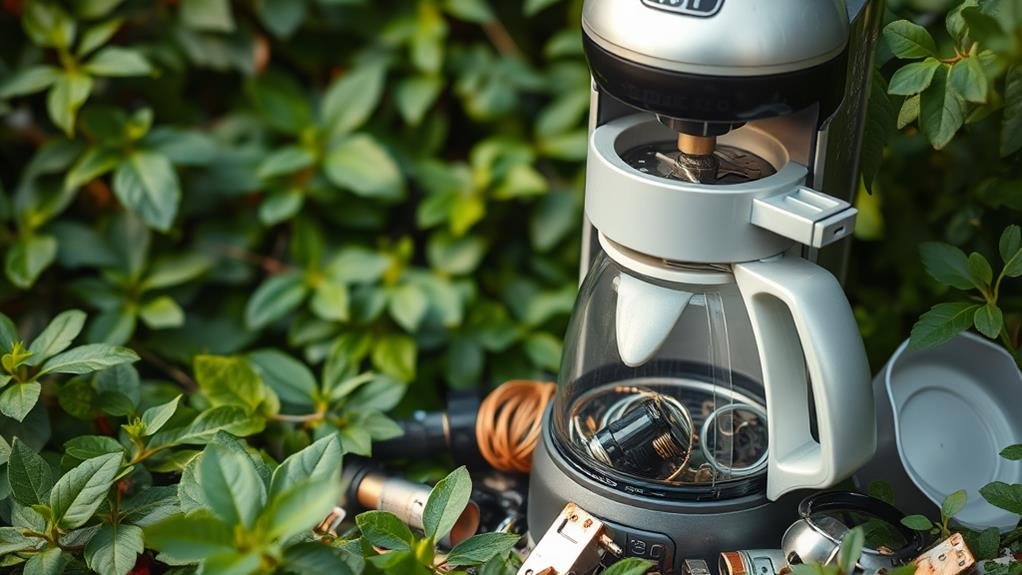
As I explore into the process of recycling my old coffee maker, I'm discovering the significant environmental benefits that come with it. By choosing to recycle, I'm reducing electronic waste and contributing to a more sustainable future. Here's a breakdown of the positive impact:
- Recycling one coffee maker saves energy equivalent to brewing 1,000 cups of coffee.
- Properly recycling coffee makers reduces greenhouse gas emissions by decreasing raw material extraction.
- Recycling coffee makers helps conserve water, reduce air pollution, and prevent toxic chemicals from harming the environment.
- E-waste from coffee makers can release harmful chemicals if not recycled correctly, impacting soil and water sources.
- Recycling coffee makers supports the shift towards a circular economy model, promoting sustainability and a greener planet.
Types of Recyclable Coffee Makers
Types of Recyclable Coffee Makers
Because I'm dedicated to reducing electronic waste, I've researched various types of coffee makers to see which ones can be recycled. If you're like me and want to recycle old coffee makers, it's important to know which types are recyclable.
| Coffee Maker Type | Recyclability |
|---|---|
| Drip Coffee Makers | Commonly recyclable, with many manufacturers offering recycling programs |
| Single Serve Coffee Makers | Can be recycled through specific manufacturer programs, such as Keurig's recycling initiative |
| Espresso Machines | Often recyclable, with metal and electronic components requiring proper disposal |
| French Press | Glass components can be recycled, while metal parts may need separate handling |
| Cold Brew Makers | Typically recyclable due to glass components used in the brewing process |
As I've discovered, many coffee makers contain metal and electronic components that can be recycled. By recycling these unwanted appliances, we can greatly reduce the amount of electronic waste that ends up in landfills. If you're looking to recycle coffee makers, it's vital to research the specific recycling options available for your device. This way, you can make sure that you're doing your part in reducing electronic waste.
Small Appliance Recycling Tips
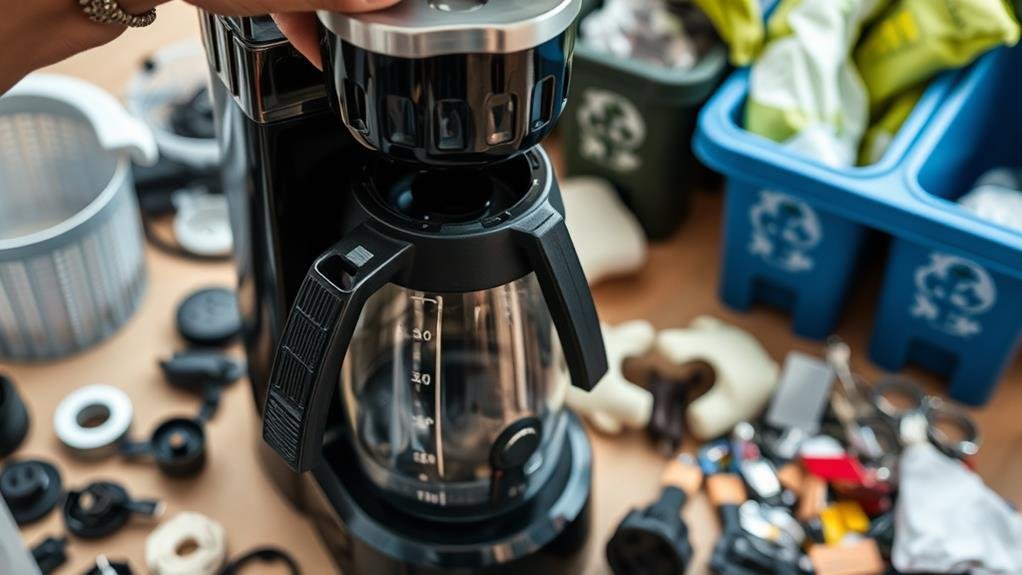
When it comes to recycling small appliances like my old coffee maker, I've learned that a few simple measures can make a significant difference. Proper disposal of electronic waste is essential, as it contains valuable metals like copper and gold that can be reclaimed through recycling. To guarantee safe and responsible disposal, I follow these guidelines:
- Unplug small appliances before recycling to prevent any accidental start-ups or electrical shocks.
- If my appliance is still in working condition, I consider donating it to extend its lifespan and benefit others.
- I separate non-metal parts from the appliance to facilitate the recycling process.
- I check with local recycling programs or facilities to see if they accept small appliances, so they don't end up in landfills.
- I make sure to recycle my small appliance with a reputable recycler who can extract valuable metals and handle the electronic waste responsibly.
Electronic Component Disposal
With electronic components like circuit boards at their core, coffee makers are classified as e-waste, making their disposal a critical issue. When getting rid of your coffee maker, it's crucial to take into account the potential environmental impact of its electronic components. Improper disposal can release harmful chemicals like lead and mercury into the environment, adding to the increasing problem of electronic waste. In the USA, e-waste comprises 10% of landfill waste, underscoring the importance of responsible disposal methods.
To ensure the safe handling of hazardous materials, I recommend recycling your coffee maker through a reputable recycling company. These companies specialize in effectively managing e-waste, promoting sustainability and reducing environmental harm. By recycling your coffee maker, you'll be contributing to decreasing the amount of e-waste in landfills and preserving natural resources. When selecting a recycling company, look for one that follows responsible e-waste disposal practices. This way, you can be confident that your coffee maker's electronic components will be managed and processed in an environmentally conscious manner. By taking this action, you'll be supporting a more sustainable approach to e-waste management.
Conclusion
As I wrap up my old coffee maker for recycling, I'm reminded that its demise marks the beginning of a new life – not in a landfill, but in a recycling facility. Disposing of coffee makers responsibly is a stark contrast to the harm caused by reckless waste management. By donating, disassembling, and recycling our small appliances, we not only preserve natural resources but also take a small yet significant step towards a more sustainable future.

